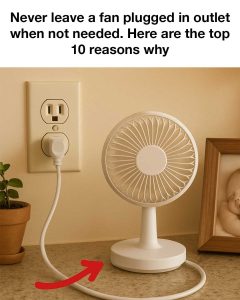In today’s energy-conscious and safety-focused world, the habit of unplugging household appliances like fans when they’re not in use can offer more benefits than most people realize. While fans provide much-needed relief during hot days and help circulate air throughout our homes, keeping them plugged in unnecessarily may pose hidden risks and lead to long-term consequences. From energy waste to potential safety hazards, there’s a lot more to consider than just flipping the switch off. Let’s take a closer look at the top ten reasons why unplugging your fan when it’s not needed is a smart, responsible habit that can positively impact your wallet, your safety, and the planet.

One of the most immediate and noticeable benefits of unplugging your fan is the reduction in energy use and the savings on your utility bill. Most people don’t realize that even when a fan is turned off, it can still consume electricity as long as it remains plugged into an outlet. This small but constant energy use is known as phantom load or standby power. Over time, these tiny amounts of wasted electricity accumulate, resulting in higher energy bills. By getting into the habit of unplugging your fan when it’s not being used, you eliminate this unnecessary energy drain and contribute to lower monthly electricity costs. It’s a small action with a big financial payoff over the long run.
Another crucial reason to unplug your fan is safety. Any electrical device left plugged in continuously can potentially become a fire hazard, especially older models or those with frayed cords or worn components. Dust build-up, heat retention, and unexpected electrical surges can all contribute to a higher risk of short circuits and, in extreme cases, fire. Taking a few seconds to unplug your fan when it’s not needed can drastically reduce the risk of fire, helping to protect both your home and your family from a preventable tragedy.
Unplugging your fan also helps preserve the appliance itself. Just like any other electronic device, fans suffer from wear and tear over time. Keeping a fan constantly connected to power—even if it’s turned off—can still place a strain on internal components, including circuits and sensors. This ongoing strain can shorten the life of the fan, leading to more frequent replacements and additional expenses. By unplugging your fan when you’re not using it, you reduce unnecessary stress on its parts, keeping it in good working condition for longer.
Another important consideration is the risk of overheating. Fans, especially if they are used frequently or located in areas with unstable power supplies, can overheat if left plugged in. This could result in damage to the motor or other critical components, possibly rendering the fan useless or requiring expensive repairs. Simply unplugging your fan after use can prevent these issues altogether, helping you avoid unnecessary maintenance or replacement costs.
Beyond personal benefits, unplugging your fan also contributes to the greater good by lowering your carbon footprint. Every unit of electricity saved reduces the demand on power grids, many of which rely heavily on fossil fuels like coal and natural gas. By cutting back on your power usage—even in small ways—you play a role in reducing greenhouse gas emissions and promoting environmental sustainability. When millions of households adopt this habit, the combined effect can be incredibly powerful in the fight against climate change.
Some fans may continue to emit a low-level humming sound or electrical noise when they’re plugged in, even if they’re not running. This constant, low-frequency sound can contribute to a noisier home environment, interfering with sleep, concentration, or relaxation. Unplugging the fan eliminates this background noise, helping you maintain a quieter and more peaceful living space.
From a home safety perspective, reducing the total electrical load in your house is always a good idea. Electrical circuits can become overloaded if too many appliances are plugged in at once, increasing the risk of tripping breakers or damaging sensitive electronics. By unplugging fans that aren’t in use, you reduce the strain on your home’s electrical system, making it more stable and secure overall. It’s an easy way to reduce the chances of unexpected power issues or appliance damage.
Not only does unplugging your fan protect the fan itself, but it also helps protect the outlet it’s plugged into. Constant use of an outlet can wear down its internal connectors over time, especially if the plug is never removed. This wear can lead to loose connections, sparking, or even electrical arcing—conditions that are both unsafe and expensive to fix. Giving your outlets a break by unplugging unused devices extends their lifespan and ensures safer operation in the long term.
This simple act of unplugging also promotes mindfulness and conscious living. In a world of constant activity and consumption, taking the time to unplug devices like fans encourages awareness of your habits and their impact on both your home and the environment. It helps build an intentional mindset—one that values small, thoughtful actions and recognizes how they can lead to bigger changes in lifestyle. This type of conscious decision-making often extends into other areas, such as reducing water waste or limiting plastic use, ultimately fostering a more sustainable way of living.
Finally, regularly unplugging your fan builds a habit of responsible energy use. It sends a positive message to others in your household, especially children, about the importance of conserving electricity and being environmentally conscious. These habits, once formed, can influence future choices and help shape a generation that values efficiency, safety, and sustainability. It’s about more than saving money—it’s about doing your part and encouraging others to do the same.
In conclusion, taking a moment to unplug your fan when it’s not in use is a simple and powerful practice. It helps conserve energy, enhances safety, extends the life of your appliance and your outlets, and contributes to a greener planet. To make this habit easier, you can place small reminders near outlets, include unplugging in your daily routines, or even invest in smart plugs with timers. Whatever approach you choose, the results will speak for themselves—lower bills, safer living, and a home that supports your efforts to live more responsibly.





